2019-2020 Academic Year Fall Semester TLDU Update
Dear all,
Please find the Teaching and Learning Development Unit updates for 2019-2020 Academic Year Fall Semester below:
1. Professional Development Activities
1.1. Common Time Sessions
There were seven sessions given by the voluntary instructors in the fall semester and all of them were repeated so that instructors with different timetables could join:
In addition to these sessions, we had the reading club. Five sessions were held biweekly starting from week 3 for both the morning and afternoon group. In total, 100 participants attended all the conducted throughout the module. We would like to thank our colleagues who gave the sessions and the ones who attended and contributed to these sessions.
We hope we will continue sharing our ideas and expertise with each other in the future:)
You can find some photos from the sessions below:
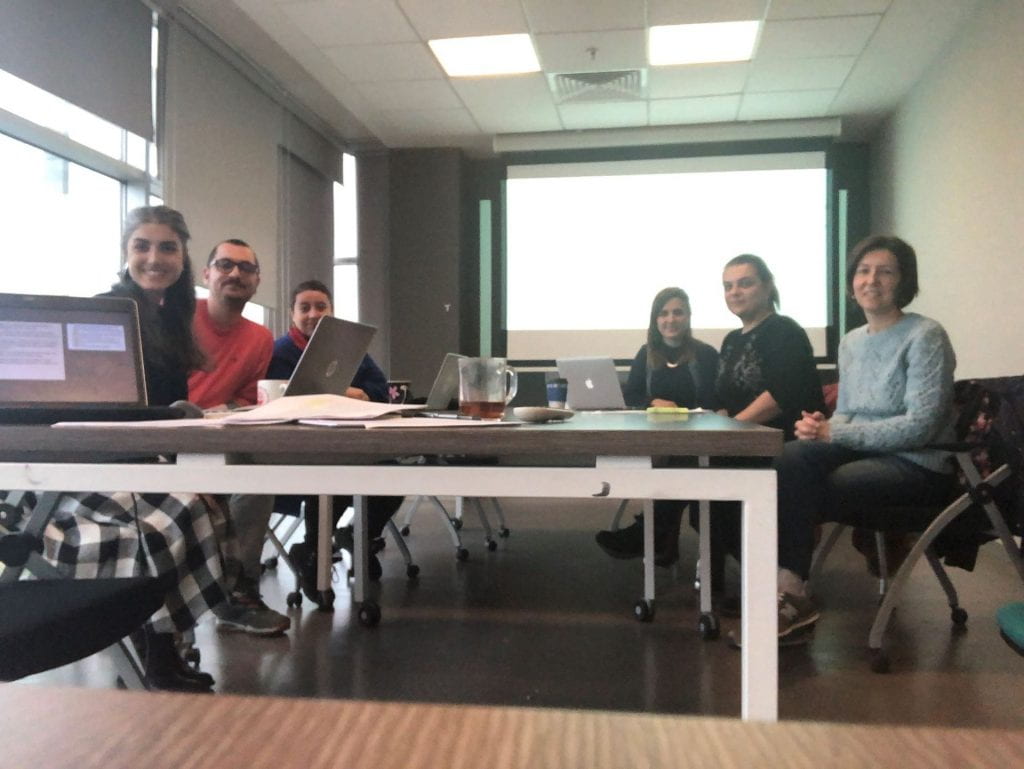
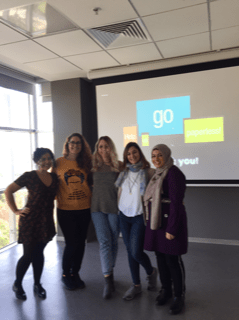

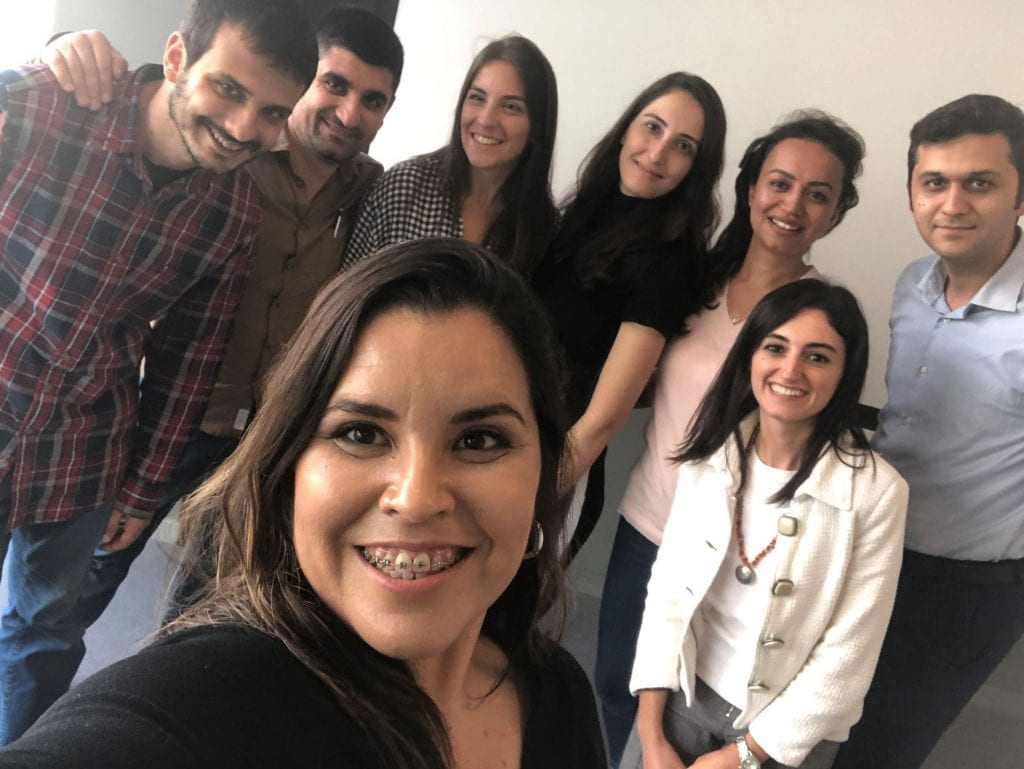
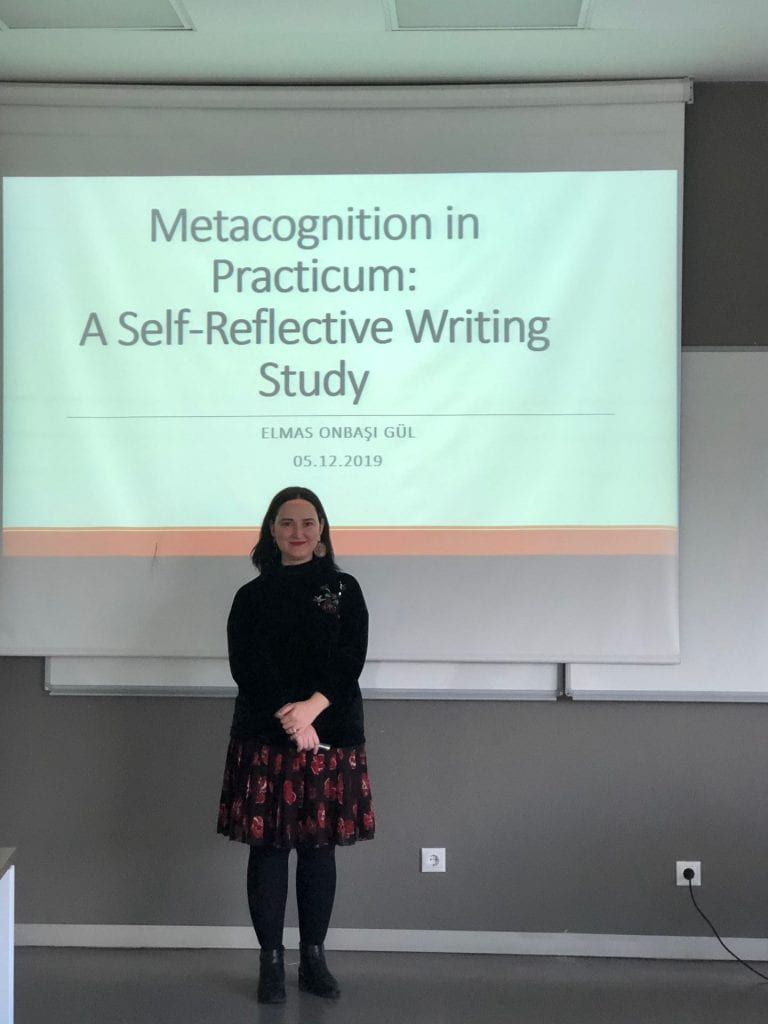
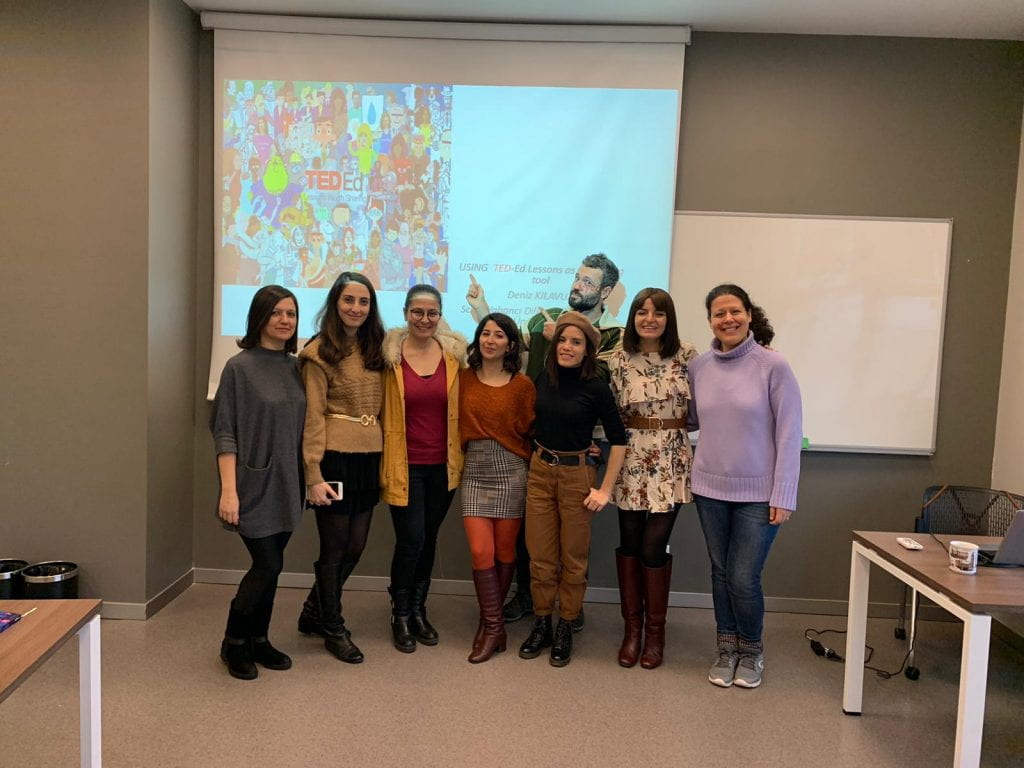
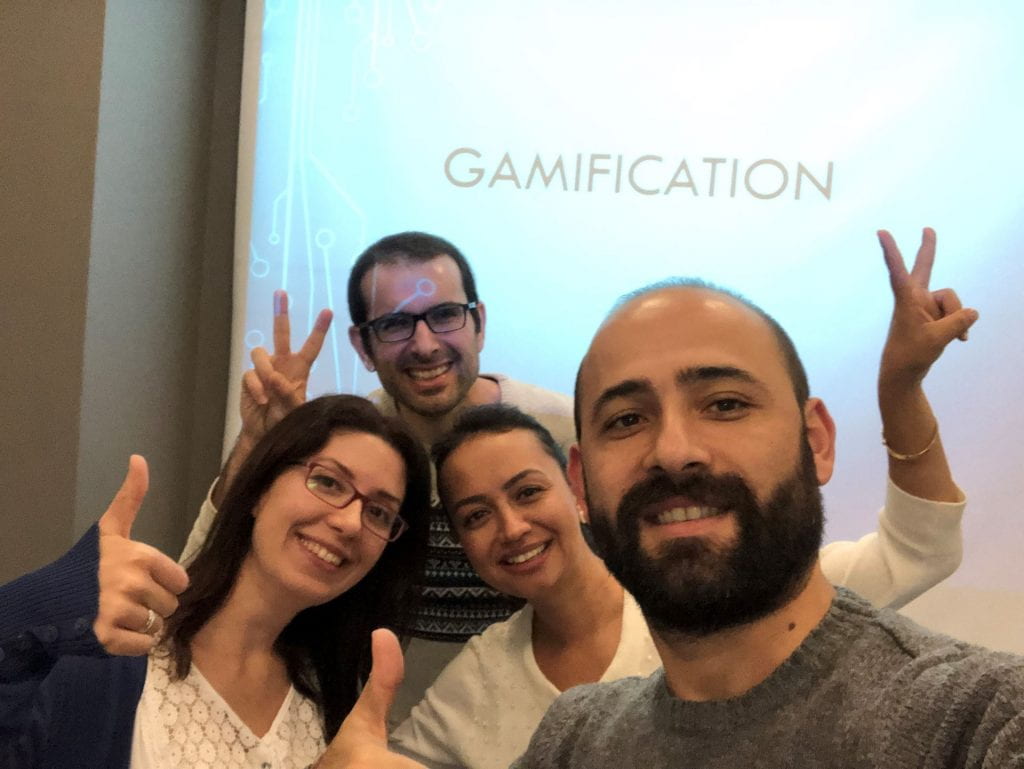
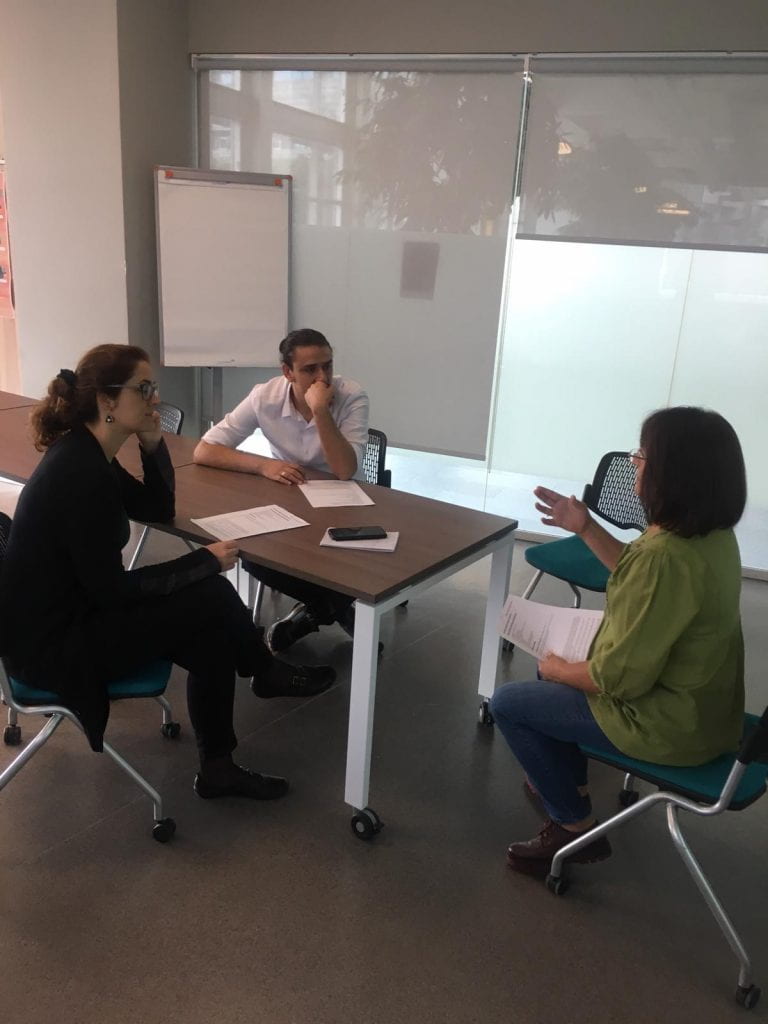
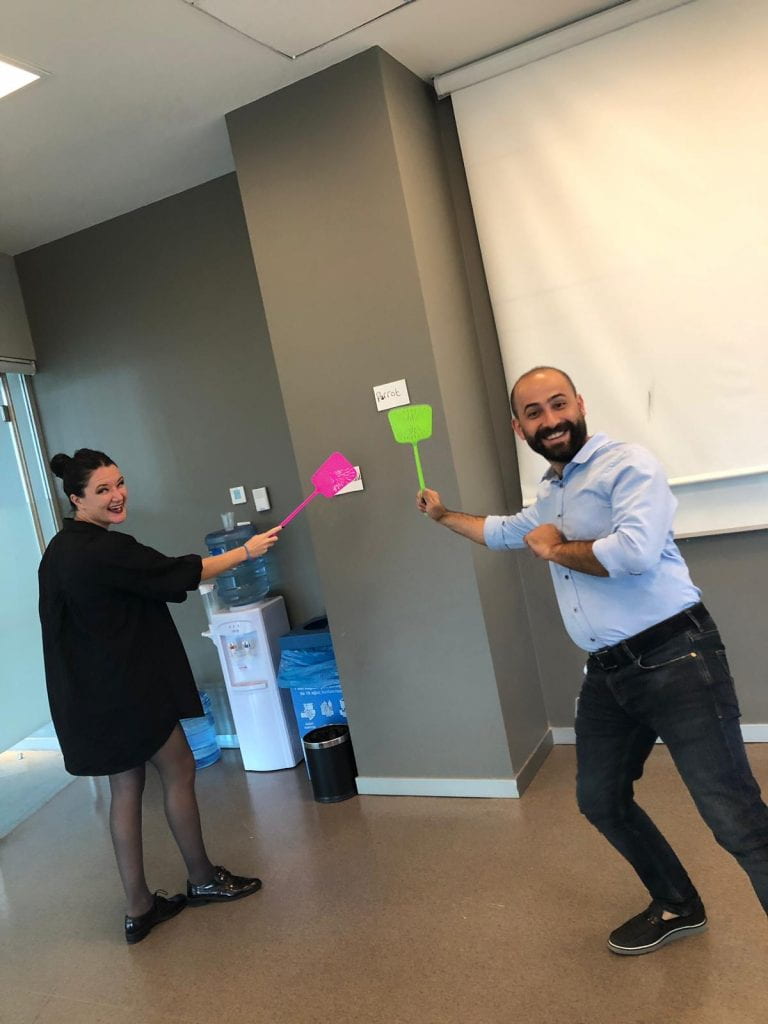
2. Extra/Co-curricular Language Development Activities
2.a. Study Center
In 2019-2020 Academic Year Fall Semester, ScOLa Study Center was visited 226 times by our students. The students visited the center for 148 times to get extra support on their writing skills, and 44 times to get support on their grammar & language related questions. They also visited the center 27 times to get guidance on how to study English and how to prepare a study plan. The center was also visited for reading and vocabulary related questions of our students. In addition, support lessons have been provided to the students of A2, B1 (Extension) and B2 (Extension).

2.b. Study Center How to Seminars
In 2019-2020 Academic Year Fall Semester, Sec 101 Seminars have been held by Scola Instructors. In total 8 seminars have been organized and 171 students attended those seminars:

2.c. A2 project
Although the A2 project class started with 148 students, 19 students completed it successfully in this module. Students were expected to attend the the sessions and complete all the oral or written tasks during and after each session as well as the final task which was creating their blogs. Throughout the module the students worked hard in order to come up with their own answers to the question “How can you be a successful language learner?” by completing various tasks and the end product was their blog on how to be a successful language learner. You can have a look at some of the student blogs below. We hope you will enjoy them.
burakasker.blogspot.com
whylearnewlang.blogspot.com
berfinnewblog.blogspot.com
bloggerefsa.blogspot.com
gonulkirma.blogspot.com
2.d. B1 project
Although the B1 project class started with more than 214 students, 111 students completed it successfully in this module. Students were expected to attend the the sessions and complete all the oral or written tasks during and after each session as well as the final task which was shooting a short movie.
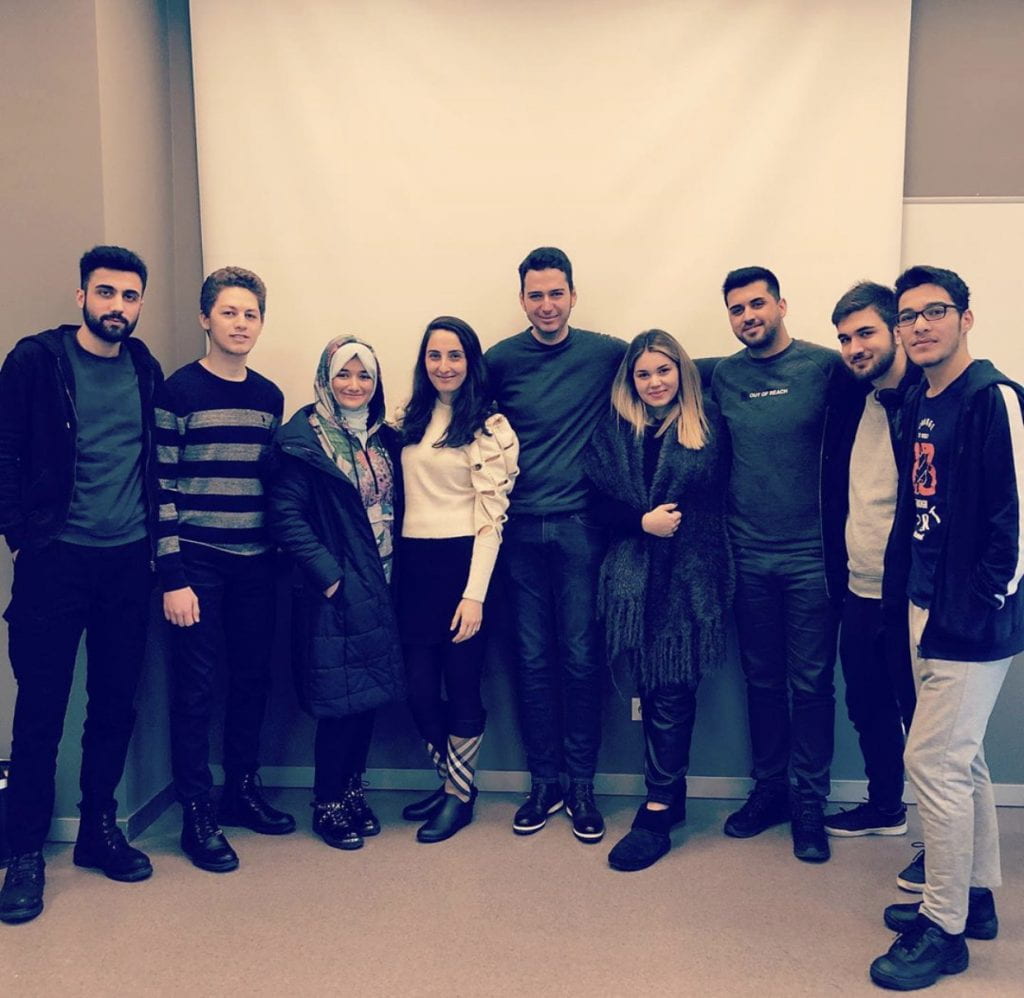
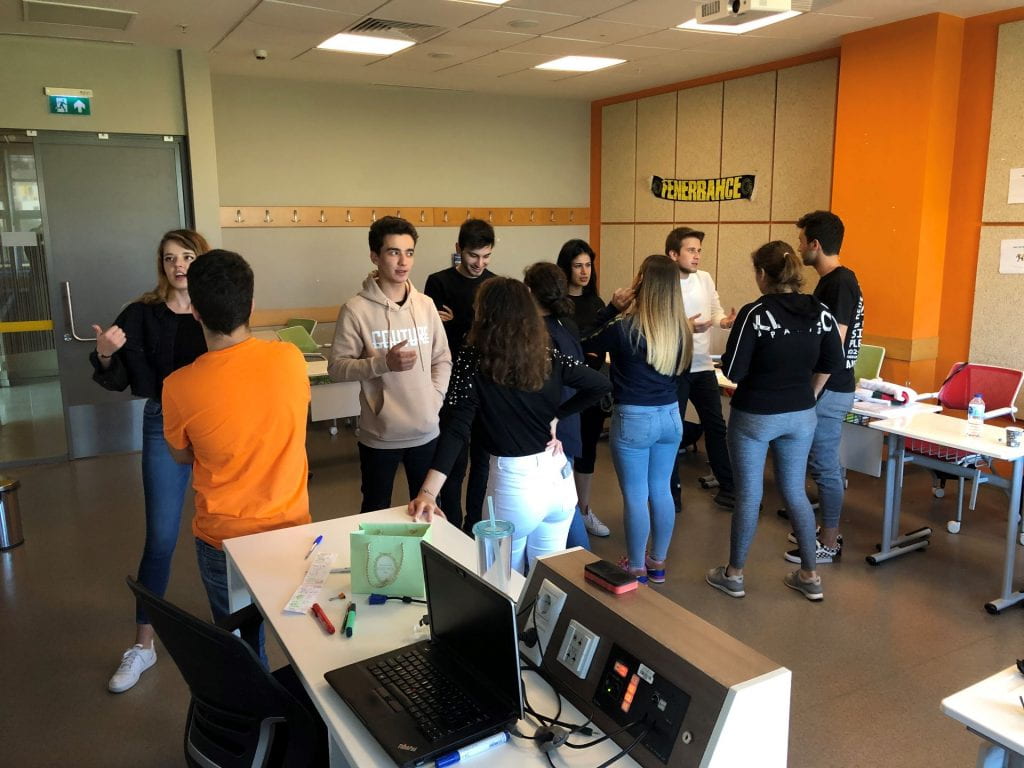
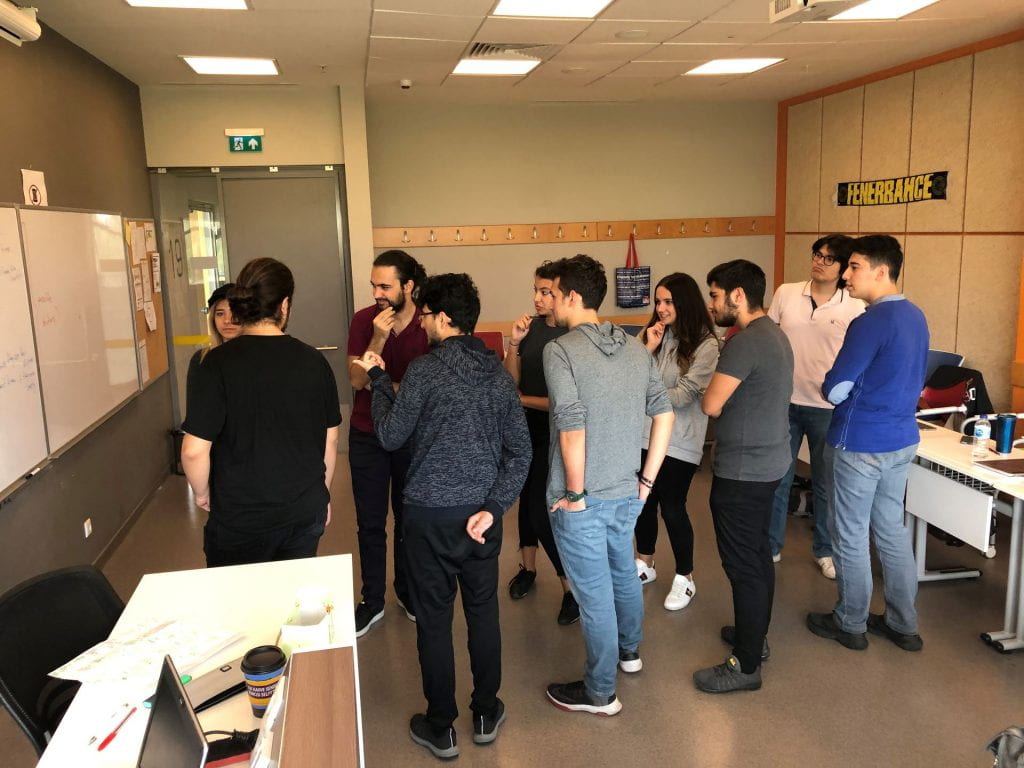
The first phase of the project started with the input sessions/tasks which provided students with the opportunity to read and listen to different views of different parties on the generational differences and challenges of teaching/working with/communicating with the new generation. All the tasks were in line with B1 level objectives and some of the tasks completed were conducting interviews with their teachers, reporting their interviews in the sessions, participating in group discussions, conducting research on the issue and presenting their findings orally in the classroom. For each task they were assessed based on the criteria that had been shared with them.
The second phase of the project started with narrowing their topics down and learning about the features of shooting an effective short movie. They were supposed to choose a problem related to teaching the new generation, to raise awareness of others on the issue and propose a solution directly/indirectly. Each week they also completed a different step (submitting project proposal, describing the characters and main scenes, writing the first draft of their scenario, etc.) and received feedback to make necessary revisions. Since they worked hard, took responsibility and managed their time effectively, they could produce great projects.
You can watch the movies for which we got the permission from students to publish. We hope you will enjoy them.
2.d. ScOLa Clubs
This semester we provided our students with 10 different club activities focusing on different skills ranging from speaking to wiriting. In total, we reached many students through our club activites and 20 of them were awarded with the certificate of participation since they are the regulars who attended more than half of the sessions. With these certificates, the students were also able to receive credit for SEC 101 course. Below you can see the details regarding our clubs. We hope to provide more club opportunities for our students in the upcoming semester. If you would like to offer a club in one of your interest areas, please contact: esra.celik@ozyegin.edu.tr by January 27th.
Below you can find the updates writtten by the instructors who conducted the clubs:
Cultural Exchange Club Fall 2019:
Cultural Exchange Club was offered to B2 level students as an extra-curricular activity in collaboration with introductory human geography students at the University of Wisconsin-Fox Valley to provide them with increased authentic learning practice and intercultural communication.
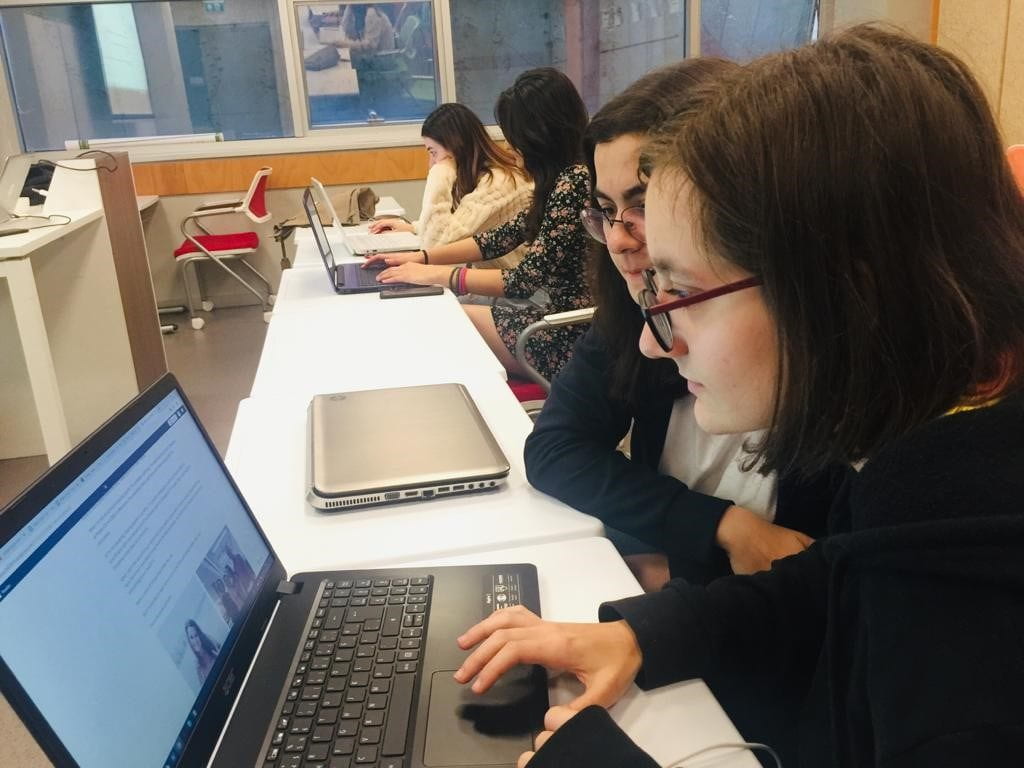
As the first step in this process, students were given training on the use of technology. Although they were comfortable using mobile devices and social media, extra training was required for the use of Web 2.0 tools implemented into the project to facilitate the online exchange. The second step was to help students gain intercultural awareness through classroom practices. Then, students from both partner universities introduced themselves on a blog platform.
For the next step, they initiated online conversations by commenting on the posts and asking questions to get to know each other. In the meantime, they decided on the topics which they would exchange information on. Forming the groups, they worked together to produce knowledge on the topics below:
❏ Customs & Values & Role of Family & Attitudes about personal time/space
❏ Movies & TV Shows & Literature & Music
❏ Historical sites & Food & Celebrations
❏ Family and cultural traditions & Holidays
❏ Sports and recreational activities & Free time activities & Youth culture
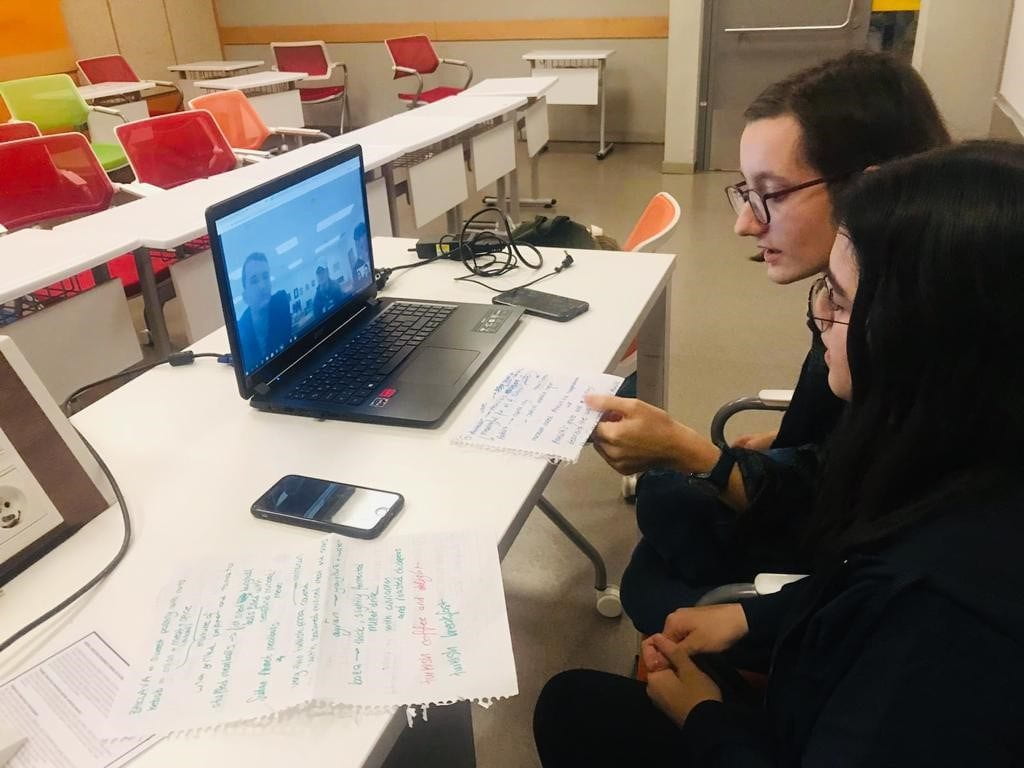
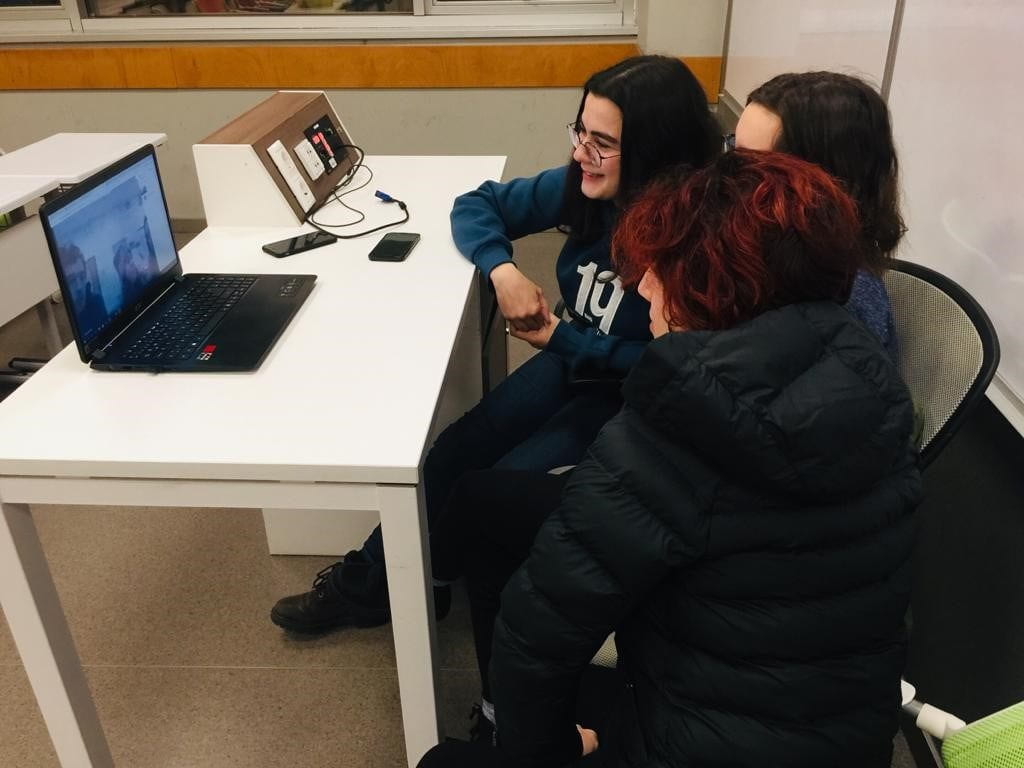

Completing necessary preparations, they had video chats on the topics they chose in groups. As a follow-up activity, they were asked to write another blog post summarizing what they shared and learned during the online conversations. Reading and commenting on the summary posts, they maintained the written communication for a given period of time.
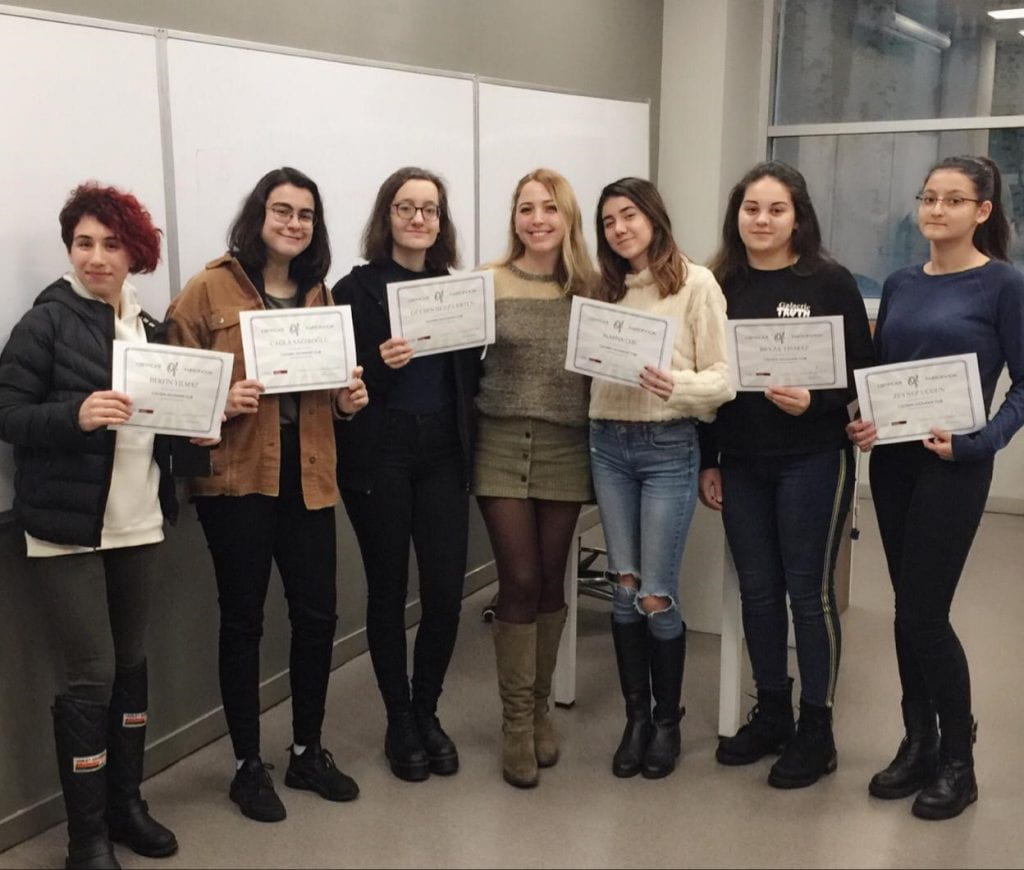
Students completed all the tasks with great enthusiasm and dedication. They attended all the meetings where they were provided individual guidance as a part of this ongoing process. Their comments below reflecting their experience of the Cultural Exchange Club reveal how they benefited this experiential learning opportunity.
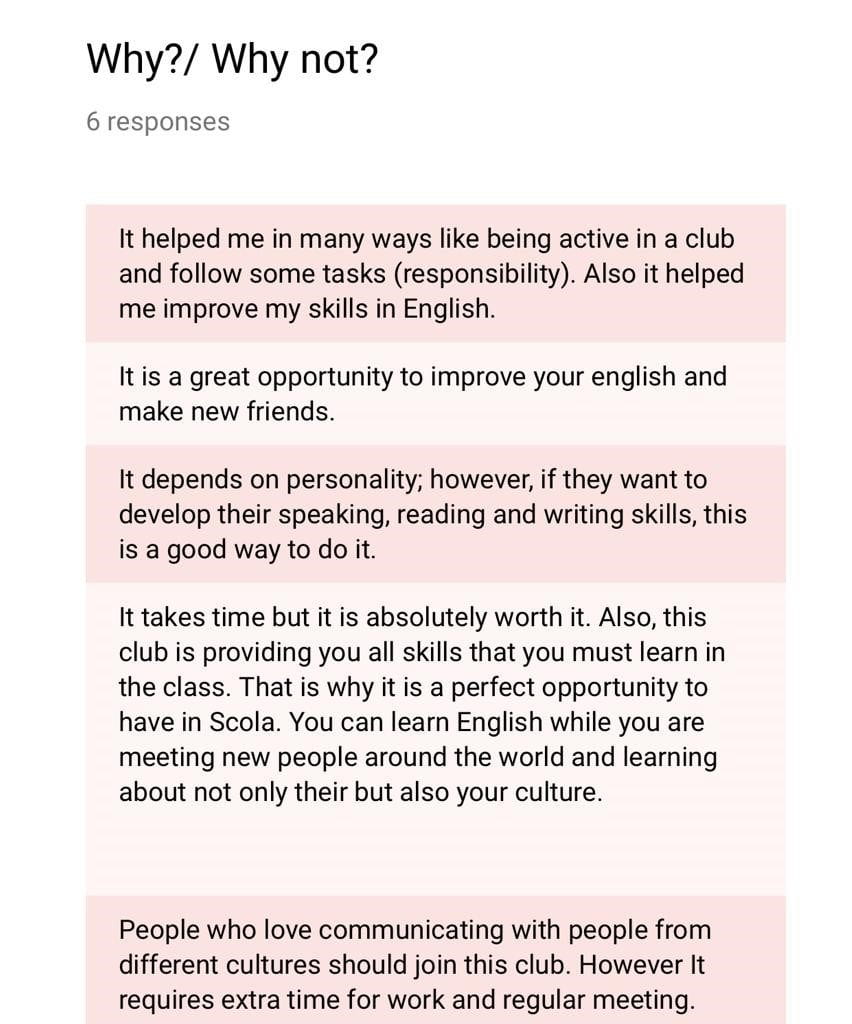
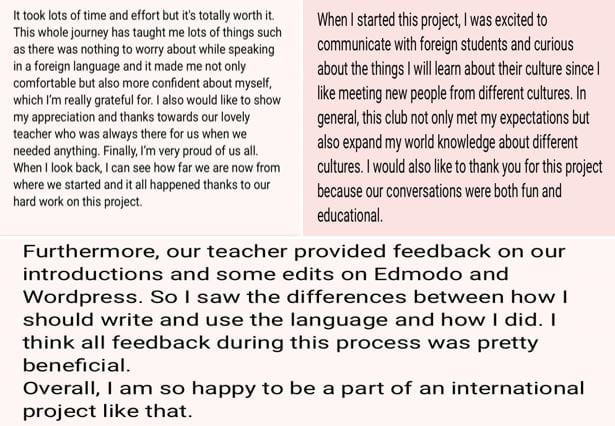
A2 Speaking Club:
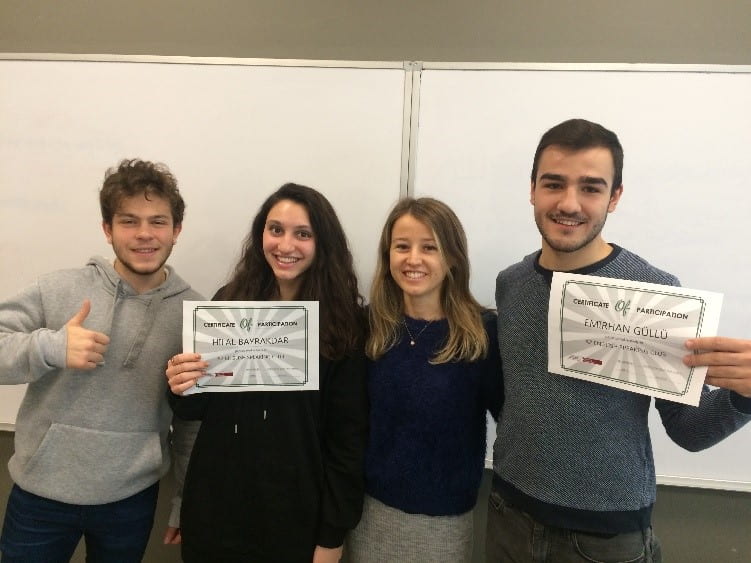
In A2 Speaking Club, we held sessions prepared in line with weekly level objectives. There were four available slots for the students to attend on Wednesdays and Thursdays. Every week students were involved in communicative and interactive activities like information-gap tasks mostly, where they would have a real need to communicate. We had a total of 12 weeks. In order to get a certificate of participation and one credit for their SEC 101 course, students needed to attend minimum 8 sessions. Although the number of students who showed up for some of the sessions was around 40, 5 students were eligible to take the certificate and one credit for SEC 101 course.
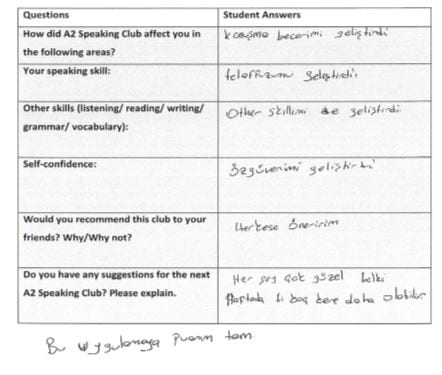
Business English through Board Games Club:
Students who are interested in business life attended this club to learn new things about business life and spoke English in business context while playing board games. B1 and B2 students attended this club and mostly students were interested in running their own businesses or working for global companies. At the beginning of the club, I asked all students to prepare a company profile for themselves and create an imaginary profile about themselves which include information about their imaginary workplace, position, qualifications and responsibilities. Students used those profiles while playing the games because we assumed that they are already in business life. Every week we played a different board game and some games required some background information or some vocabulary teaching. After learning those new words or concepts, we started playing games and we had a lot of fun. We met with students ten times and the students who attended more than half of these sessions were eligible to receive a certificate of participation which can be used to earn credit from SEC 101 course. These are the photos and comments from the students.
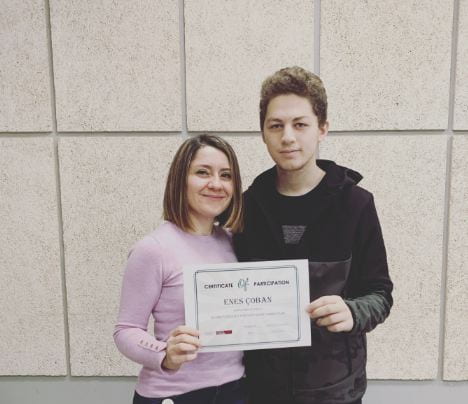
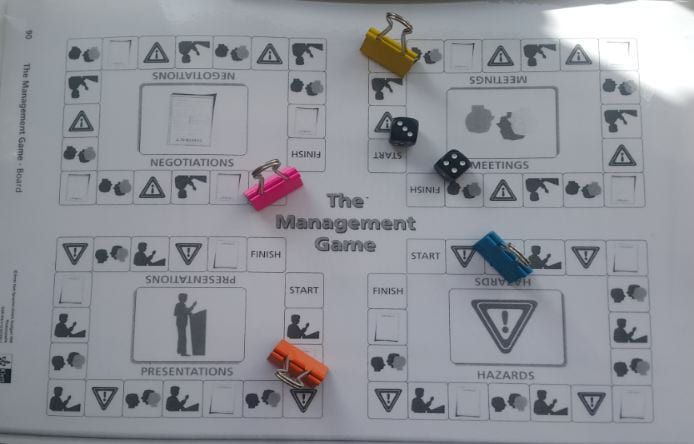

B2 Movie Clip Club:
This club was designed to expose B2 level students to natural expressions, natural flow of speech as well as natural pronunciation and accents, everyday vocabulary, spoken grammar, common idioms and slang in English. Every week we watched some short clips from a different kind of a movie ranging from comedy to historical epic. Depending on the content of the clips, we held different activities aiming at practising mainly speaking or writing skills. We started with three students, but only one of them attented the expected number of the sessions, which makes her earn credit from SEC 101 course.
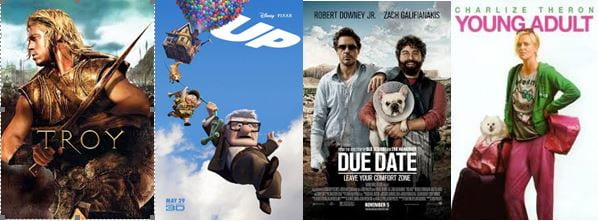
Rock Music Appreciation Club:
Rock Music Appreciation club was designed in 2019 Spring and Summer semesters. It has been conducted since September 2019. It is designed for B2 level learners as each rock music era may require a great deal of vocabulary knowledge as well as background knowledge. Three students have attended the club that took place in room 208 every Wednesday. While they were attending the club, we went over how rock music was born, rock stars of that time and some samples and rhythms belonging to that era. There have been tasks designed after each session; however, due to attendance issues, the club could not lend itself to solid products, which are tasks designed by the creator of the club. We hope we can go on with the club in the prospective semesters with B2 and B1 levels.
Literature Club:
In Literature Club, the aim was to make students read a piece of literary work and then produce a work on it either in written or spoken form. Each session included different focuses letting students gain insight into different genres with some famous examples and it paved the way for a more detailed exploration of literature with poetry, drama, mythology and short stories. The sessions included the examples of magical realism, Shakespeare sonnets and stories of Greek and North mythology.
This term, we implemented the club with B1 students who benefited from it in the first weeks of the term, but it will be much better to continue it with B2 students that will take more advantage of it.
B1/B2 Speaking Club:
In our weekly club, students were given topics for discussion with relevant input vocabulary, chosen either from the themes covered in the course or themes that had a close connection to them. Some examples of the lessons used were ‘Icons, Leaders and Heroes’ and ‘Social Activism’.
In the first 3 or 4 weeks, attendance was high, with between 10-15 students attending each session. This allowed the opportunity for a good, student-centred discussion setting with students being given the input material and then carrying out natural and uncontrolled discussions in small groups, and after that a whole class discussion to give the lesson a natural closing. In this way students got both the opportunity to practice their spoken English with each other, and, with myself. In all, it really served to get a maximum number of students talking at length in English, even the more reserved individuals.
In later weeks, student numbers were lower, with new attendees coming for one or two sessions. In these sessions, we were able to deviate from the lessons plans I had ready because they were really suited to larger groups, but the advantage with this change was that students had the opportunity to talk freely without being constrained to a theme or topic.
Student feedback:
We could practice with a native speaker.
I feel myself more confident to speak English now.
This helped me alot speaking English.
I developed my speaking there.
Club was good for my speaking.
The club helps me with speaking exam.
B1 Translation Club:
In translation club, I met B1 students who consider translation as an important aspect of language learning. We met once a week and had a chance to practice what they have studied in their classes in the previous week. We usually focused on grammar and vocabulary objectives and the students were mostly given the chance to translate from Turkish to English, and we sometimes had English excerpts. Once we even tried a little bit of consecutive translation ^^ We listened to some documentary videos and the students were able to translate what they have heard (or read in the subtitles )
Personally, I wanted to share this experience with our students and show them that they do not need to have a fear of L1 while learning a foreign language. In contrast, they can benefit from it a lot while trying to understand complex grammar structures or use of vocabulary in English.
We met for 12 times and the regular students who attended 8 of these sessions were eligible to receive a certificate of participation which can be used to earn credit from SEC 101 course. 10 students attended the club, 3 of whom were entitled to receive the certificate. Below you can find the feedback students gave regarding the club.

Creative Writing Club:
In 2019 – 2020 Fall Semester, I had Creative Writing sessions with B1 students for the 4th time consecutively. Throughout the semester I hosted around 20 different Ss, 4 of whom got entitled to get a certificate, which was a higher end semester number compared to the previous years.
The sessions basically aimed at flipping undergrad Ss’ way of thinking before or during the production of a writing task. To realize this aim, I carried out sessions including the use of literary remarks such as metaphor or similé on written expression, types of poems like Japanese haiku, techniques of poetry writing such as rhymes and count of syllables. Besides these techniques, among the changes I have made in the syllabus of the club was setting a tone for a paragraph topic. In this sense, I asked each student to adopt a different tone while writing about the topic. That is to say, while one student’s tone was critical, another one wrote a paragraph about the exact same topic with an alert or satisfied tone. Then I asked all Ss to produce written paragraphs in three different tones on the same topic. The outcome was intriguing and mind blowing. All Ss attending this session have found this session really useful in their regular classes. What I actually did was to show them a sneak peek of copywriting for a film or a play.
In the light of this feedback and data, as I always have advocated and now that a change has been an ongoing change in academic writing standards, writing is all about way of thinking and sets of techniques which can only be effective when combined with real human emotions and ways of expressions. Prescriptive ways of academic writing and its conventions are seemingly becoming outdated and upcoming generations are fiercely refusing to be artificially formal and serious on their written expressions. Now that the future of the world will be laid on their hands, why be afraid to accept the change and adapt writing to their ways?
Here’s an example haiku from an anonymous Creative Writing Club Student:
“I made a small bridge,
From wood and some soil.
Can it withstand the water?”
A2 Travel Club:
The aim of the travel club was to meet students from all levels to share travel experiences and explore new places by sharing as well as providing the students with opportunities to improve their speaking skills. However, since the time of the club was suitable for only B1 level students, it turned out to be a B1 level club. Unfortunately, the club didn’t receive the expected interest and only one student attended the club regularly though in few sesssions, there were a couple of students. Therefore, the club turned out to be a speaking club for the specific needs of that specific student. In the end, one student was able to complete the sessions and received a certificate of participation which enabled him to earn credit from SEC 101 course.

Leave a Reply